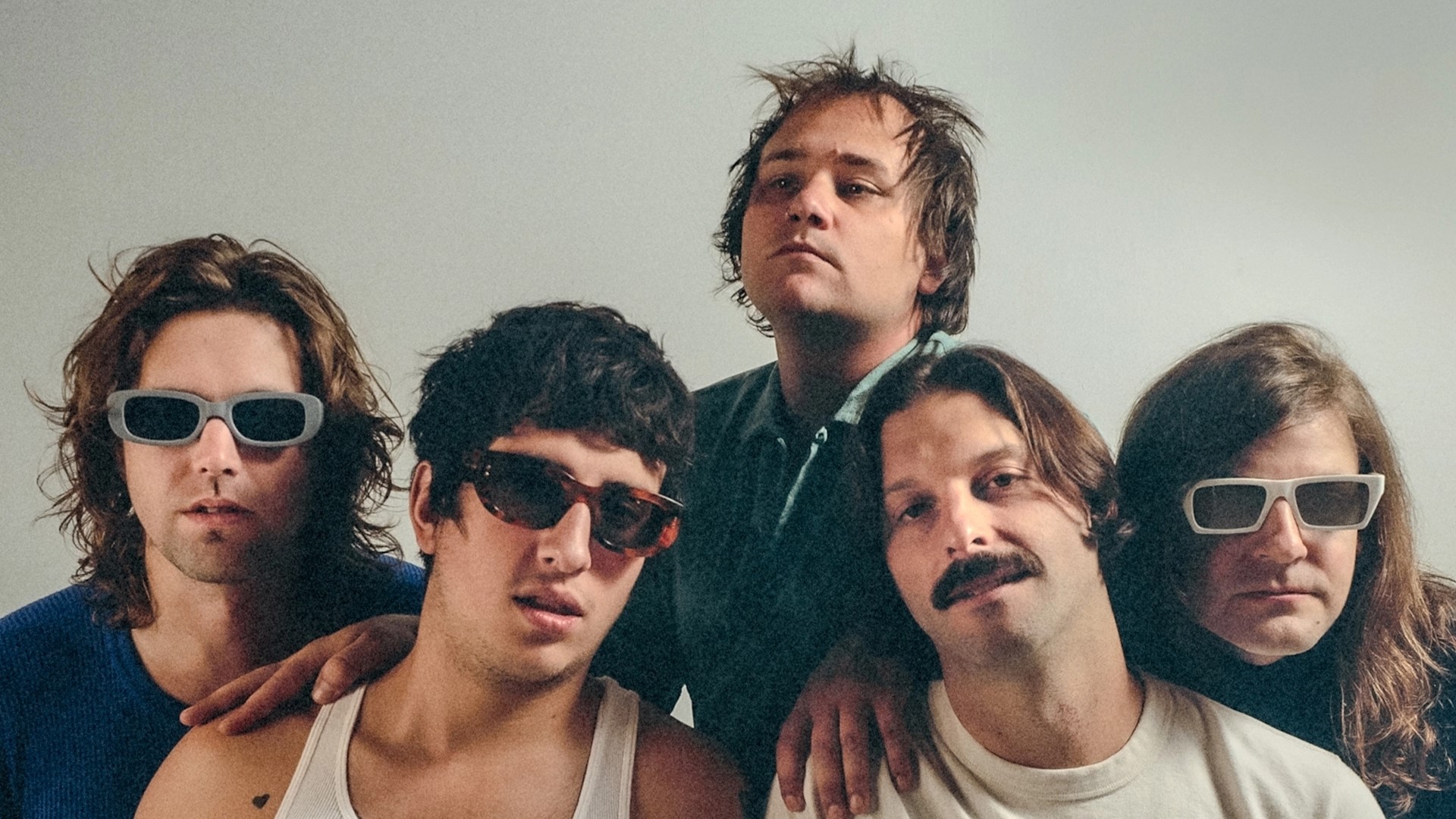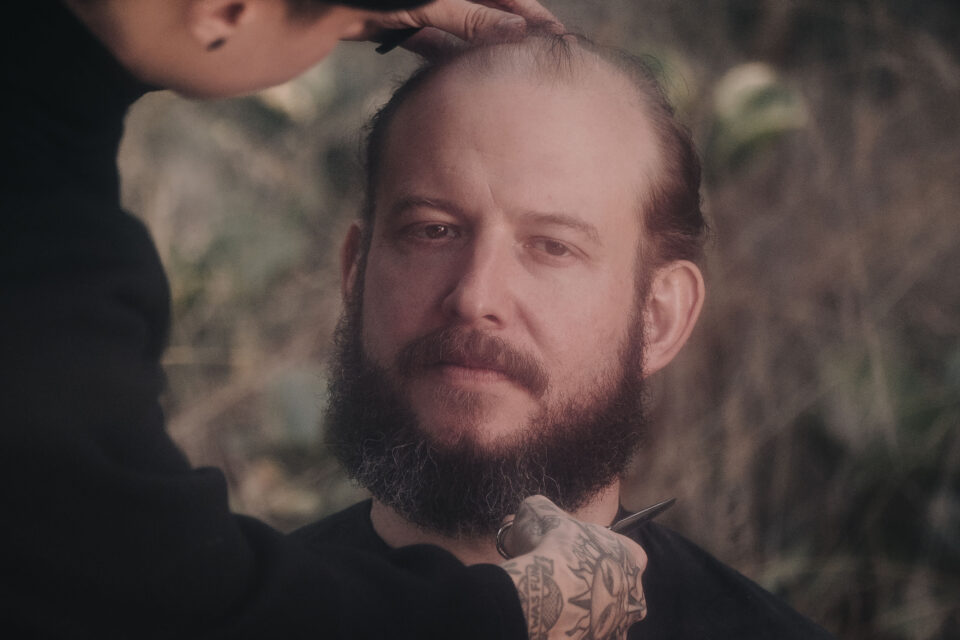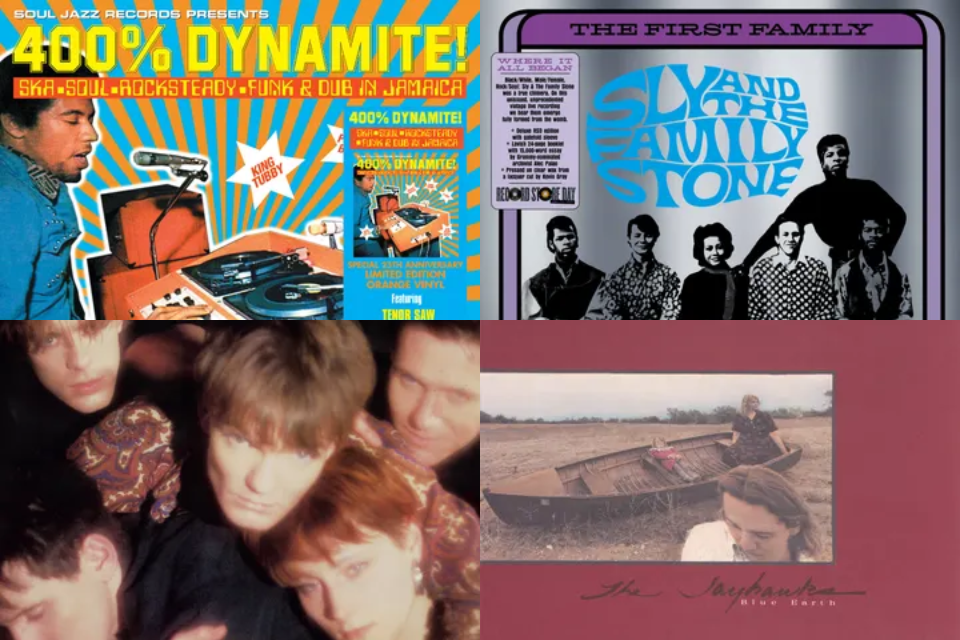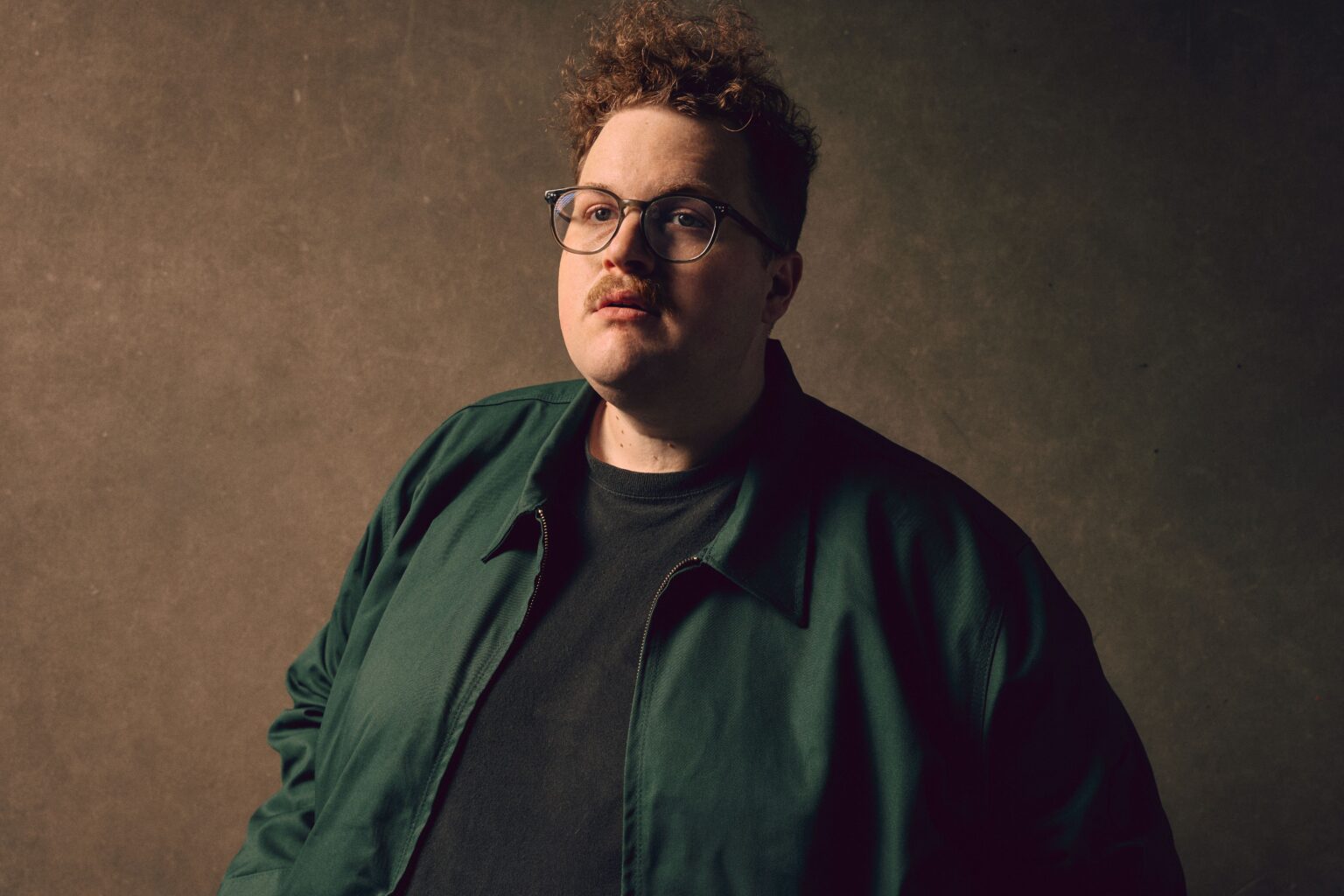The synth-tastic indie rock quintet called New Translations (formerly known as Jive Talk) formed in Nashville by way of the chemical reaction of old friends combined with new acquaintances and a heavy dose of eastside bar magic, tale as old as time. They’ve since signed with local label War Buddha (led by two members of country rock trio The Cadillac Three) and recorded the majority of these new tracks at Polychrome Ranch in rural Hartsville, Tennessee with producer Jared Corder, one half of the celebrated regional band *repeat repeat.
Before the release of New Translations’ official debut full-length on Valentine’s Day, bandmates Oliver Pierce (singer) and Andrés Ahogado (multi-instrumentalist) joined me at WNXP to talk about the making of Vacation.
Get to know New Translations when you hear the whole interview with Oliver and Andrés here and/or via WNXP’s podcast channel. The hometown Vacation record release show is February 22 at The Blue Room with openers HR Lexy and Pressure Heaven. In May, the band will play some North American dates opening for former Nashville Artist of the Month Rainbow Kitten Surprise.
Band formation slash “meet-cute”
Celia Gregory: Your bandmates [Ben Dunn, Isaac Middleton and Philip Walker] aren’t here to defend themselves, so I guess we could just talk trash. But I’m so glad you could join me. I have followed your band for many years. But you’ve dripped out singles. You’ve changed your sound slightly. You’ve been signed, you’ve changed your name, you’ve played Bonnaroo. There’s a lot of recent history. Could you give maybe a CliffsNotes version of your meet-cute as New Translations here at the time you’re releasing this debut?
Oliver Pierce: Oh, the meet-cute. I met Isaac in college in Bowling Green, at Western Kentucky [University]. And he and Ben, our bassist, grew up together in Chihuahua, Mexico. So they had that that history built in and separated when they graduated high school. We would we would make demos in college just for fun and ended up meeting Ben officially and Ben has a studio of 4115 on Gallatin. And and so we started getting a little more professional sounding and less bedroom-demo sounding and then I moved here, the pandemic happened.
CG: Didn’t you say you moved here the day before the tornado? [Writer note: Tornados ripped through Middle Tennessee — including densely populated East Nashville — on March 3, 2020, just days before COVID-19 lockdown. Read WPLN News coverage of the impact here.]
OP: Yeah, I’d like to think I brought it with me. I didn’t mean to, but that’s just the energy I bring, unfortunately. So it, I met Andrés and Phil at Mickey’s, where everything good and bad happens all at once.
CG: Villain origin stories at Mickey’s on Gallatin. [Laughs.]
OP: So yeah, that’s been the the crew for the last four years. Like you said, a lot has happened and we’re all still here.
The evolution of “Sally”
Andrés Ahogado: I guess the oldest song [on this record] was “Sally.” Oliver and Isaac wrote it almost a decade ago. It used to be a Western, country kind of bop and it changed a lot. It became a synth, indie rock vibe.
CG: And how was that change, how did that come about?
AA: Well, when we recorded at Polychrome, a lot of things moved, changed a lot of opinions. But it was definitely an evolution.
OP: It’s like when we played it, we would play it live. And we had some time in between. When we were writing for the record, I remember we went to Isaac’s house and he had this track that was the same chords as “Sally,” but it was set to a little lo-fi beat and it’s very vibey. And I just started singing the lyrics overtop of it and we were like, “This is how it should be now. I like where this is going.” And so we all fight it out over which version we wanted to put put on the record, but I think it made way more sense the way it came out in the context of Vacation.
Recording Polychrome Ranch
CG: So you mentioned Polychrome like shorthand for Polychrome Ranch, right? And recording with who? Tell us about your collaborators on this project.
AA: Well, the recording was with Jared Corder from *repeat repeat. He’s a close friend. And we would not have this album without him. You know, he’s got a beautiful studio in Hartsville, Tennessee. It’s also a ranch, a proper ranch with animals, piglets, donkeys. And he’s always expanding his, I guess, a real estate mogul now. [Laughs.] His facilities keep evolving. He’s got an Airstream now where he has hosted AirBnb’ers. We did the album there. Except for one song called “Coldest Century,” which is my favorite song on the record, I’d say. We did that one with Thad Kopec here in Nashville. At the time, we were thinking we didn’t have a record deal, so we were just working for singles, pretty much whatever we could get done.
CG: When you worked with Jared, I mean, in my humble opinion, and it’s just my opinion, but I know it’s shared: the man cannot write a bad song. *repeat repeat, they just have it. Somebody else you’ve worked with, Michigander, Jason Singer, same thing, right? Just like churning out the hits.
So what about working with Jared? You mentioned the evolution of “Sally,” but how influential was he in saying, like, “OK, I like this here, pull this level up”…you can do inside baseball because we’re talking to a largely Nashville audience of artists. Right?
OP: Well, what I love about Jared, my favorite thing is — and clearly he has songwriting talent and production talent and the gear. And he knows how to make it, knows how to get what he wants. But Jared has this infectious energy about him that inspires you… you know, when making an album. We were in the studio for like three months or so. Some nights, we’re staying weekends. But when you get in in the thick of it all, things can look bleak sometimes when you’re like stumped on a song. And he has this way of inspiring you and trying something in a way that that unlocks something new within you, that you might not have thought before. So it’s really like the intangibles that Jared has, as a cheerleader, a coach, the third baseman, like, you know, he wears a lot of hats at the ranch
AA: Crazy ideas.
OP: That’s that’s the magic when making an album. It’s not necessarily that he just, you know, knew how to take the bridge somewhere. He just inspired us to to keep going and not let us defeat ourselves along the way, you know?
CG: Do you remember a moment of being stumped in a song you were working on and he sort of, like, pulled you up the ladder?
OP: Well, we were working on it was the chorus of “Sheriff.” We probably wrote four different choruses, and I think Ben and I went up alone one time because the scheduling didn’t work out. And also, I think everybody was kind of sick of being stumped on this one chorus.
CG: They’re like, “Figure it out. We’ll be at Mickey’s when you get back.”
OP: “Just get it together.” Going through that, you know, [Jared] played the loop and he played songs that he thought that would inspire us. Every time we walked into the studio, it would be the song that we were starting for that day. It’s like, here’s the vision board for the day, you know, setting the tone right away.
He’d pull out all of the stops, like all his little tricks — he has like a Mary Poppins bag in his studio of different toys that maybe didn’t end up on the album but just got your brain moving in the right way. Obviously, by the end of it — and a couple glasses of Rebel Yell Whiskey, which is Jared’s favorite, in case the listeners were wondering — we got there and we we couldn’t be couldn’t be happier.
“Rat People”
CG: I want to talk about “Rat People.” Because, qu’est-ce que c’est? What are rat people? But also, this song, when I listened to it again in isolation, it sounded like Interpol to me. And I want to tell you why. Like there’s a song on [Interpol’s] Antics [“Take You On a Cruise”] that sounds like it’s multiple movements, multiple parts, where I think as a band you could have just cut it here and then that’s a new song.
CG: Can you talk a little bit about the composition of of “Rat People?”
AA: That one got started at Isaac’s basement. Our inspiration was [Men I Trust song] “Billie Toppy.” We wanted to make a song like that, that song really resonated with us.
And it ended up being not like that at all. I ended up taking this Strokes-y, kind of early 2000s, Interpol rocker. And yeah, it does have very different sections to it. It was originally called..”F Minor?”
OP: “F Chord” is what we called it called because when we were writing it, it goes to an F chord in this instrumental break, but it doesn’t fit within the musical composition at all. And in the original demo I’m going [sings] “F chooooooord!” But the idea of like the separate songs existing separately, I feel like we got that idea of working with Peter Katis, who worked with Interpol and The National. We went there with a demo for The Business EP and we finished the song. We thought it was done and we were only there for three days and on the last day he was like, “You know what? I think you just need to add a little mini song on the end of it.” And we were like, “OK,” and so we’re up all night at the piano trying to figure out how to add a mini song, you know, just to, just to go through with the project. And I think The National does that a lot and Interpol does that a lot. And so just as an exercise with “Rat People,” makes sense to us the structure and I can understand how a listener might be like, “Where does that come from?” But just never questioning it, I think leads us to that.
“Post Hang”
CG: In “Post Hang” there is a lyric that speaks to how can you make somebody fond of you. I want you to tell me about maybe the meaning behind that, unless, you know, you change names to protect the innocent. [Laughs.] Who are you post hanging with and sharing a cigarette with? Because that feels like a very Nashville story. I can put myself there, for sure.
OP: I think that was one of the more genuine…I feel like I write lyrics from other people’s perspectives as a way of taking the pressure off of myself, of being too vulnerable. Sometimes, you know, I can I can talk about other people’s stories, but I can’t talk about my own. And that was just a step outside of that. The chorus is, “What’s the point of saving money, collecting everything for the youth estate sale?” And I feel like my time in Nashville is like my youth is on display. I’m getting getting rid of it all. And I’m coming into this new chapter of my life.
The album is just, you know, pictures, vignettes of this time, a summation of Nashville in this really weird time that we live in. “Post Hang” captures that oftentimes it’s the hang after the hang, the post hanging that I have, you know, look across the way at a person that you want to make more fond of, sharing a cigarette, getting too drunk and just reflecting on the last four years that I’ve been here.
Use of synthesizers
CG: I do describe you a lot of the times, and I hope it’s not lazy, as a “synth-forward” band. It feels core to the sound now. Has that been an evolution, too? You talk about “Sally” being more of, like, some twang to it almost. Talk about the use of synth.
OP: I mean, we’ve got four synths on stage — we’re a sound engineer’s nightmare showing up to a club, you know, coming in arms’ full of of stuff. In Andrés’ studio at his house, it’s just basically a synth museum of different decades of synths and uses. We’re a nostalgic sound and we’re always drawn to the capabilities of any synth, modular or… and Andrés could probably speak to more of what draws him to that.
AA: Yeah. I think just being this eclectic assortment of people, it reflects in the way we present ourselves musically. So we don’t really sound like many bands that are from this city and synthesizers just happen to be some of our favorite toys to express ourselves and lay down these tunes.
CG: So a lot of them were born of a synth line and not a guitar riff?
AA: Sometimes, yes. Sometimes a synth batch can present inspiration that will eventually lead up to a song idea. Yes. So it’s an entire world contained in these little machines.
OP: Or when I’m writing a vocal melody, it’s always a synth.
CG: Really? Did you grow up playing piano?
OP: Not at all. No, but I went to school for musical theater, and so I took piano, like basic Piano 1 and 2. And so that’s just the easiest way for me to wrap my head around… Some people just can do it with their voice, but [for me] it has to be on a weird synth with some vibrato on it first so I can see the weird vision of where it’s going to go.
The live show
OP: Theater background, you know, as we touched on — it’s the live show has always been such an important important thing for me, to build an arc of a show. To have everyone included, you can’t just sit and, like, drink a beer and watch. To command people’s attention and have them in an immersive experience, we’re always trying to one-up ourselves, always trying to envision what show do we want to go see, what’s worth $20 to go and see? Sometimes it’s a little TV, sometimes we’re wearing nothing but really big shirts. Sometimes, you know, I’m painting the faces of the audience. .
AA: We like to make it complicated for our own demise. But the Blue Room show is going to be probably our most complicated, which we’re really excited about. We’re working with Jason — people might know him as Strange Handle. He’s one of our favorite visual artists in Nashville and we have big surprises for that show. Also super stoked for Pressure Heaven and HR Lexy. We’re super big, huge fans of them. So it’s an honor that they want to support us, and I think it’s going to be a very special night.
CG: You’re saying about preparing for these shows…I imagine your rehearsal is not just, “OK, let’s play these songs back.” You’re kind of working through as it’s a stage production. Like, what are you going to do? What do you do here?
OP: There’s a prologue, there’s a denouement, the falling. That’s also important because everybody, you know, can play a song and say, “Thank you. This next song is about…” But we like to build a through-line, where sometimes there’s four or five songs in a row where we don’t say anything and then, you know, we can tell them where the merch is and do all that afterward. But thinking of it in the way of a production, less like a show, is always where we’re aimed.




